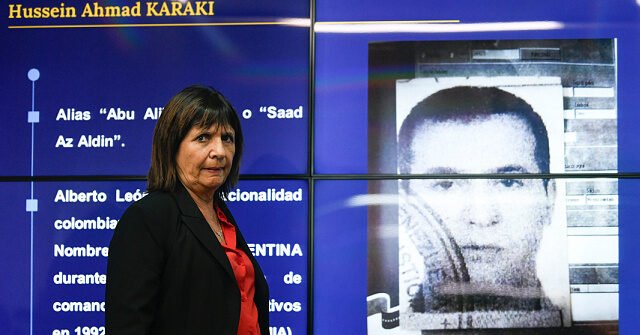In a significant announcement by Argentina’s Security Minister Patricia Bullrich over the weekend, authorities identified a Lebanese individual, Hussein Ahmad Karaki, as the leader of the Shiite terrorist organization Hezbollah in Latin America. Bullrich described Karaki as the “brain and recruiter” for Hezbollah in the region, alleging his pivotal role in multiple operations, including his involvement in two major terrorist attacks on Israeli targets in Argentina during the 1990s. This declaration was a culmination of a collective investigative effort involving Argentina, Brazil, and Paraguay, focusing on the so-called “tri-border area,” where Hezbollah has long been suspected of operating.
Bullrich indicated that Karaki acted on direct orders from Hassan Nasrallah, the late Hezbollah leader recently killed in an IDF airstrike, emphasizing the significance of Karaki’s identification, which she equated to the impact of Nasrallah’s death. Karaki is believed to currently reside in Lebanon, and Argentine authorities plan to take steps to issue an Interpol red notice for his arrest, marking a significant move against terrorism in the region. The announcement included specific allegations against Karaki, including responsibility for the bombing of the Israeli embassy in Buenos Aires in 1992, which resulted in 29 deaths.
The investigation pinpointed that Karaki had purchased the van used in the infamous embassy bombing, utilizing a Colombian passport under the name “Alberto León Nain.” Reports detail that he was present in Buenos Aires during the attack, leaving the city only hours before the explosion occurred. The investigation traces his activities across Latin America, where he is believed to have communicated and operated in Spanish and Portuguese before ceasing operations after the 1994 bombing of the Argentine-Israeli Mutual Association (AMIA), the deadliest terrorist attack in the Western Hemisphere prior to 9/11.
While he played a critical role in the AMIA bombing, there is no definitive evidence that he was in Buenos Aires at that time. Karaki reportedly re-emerged in 2004, assuming a new identity, “David Assi,” with documentation allegedly provided by the Venezuelan government. Bullrich presented evidence of his naturalization request in Venezuela, highlighting concerns that the country’s civil registry has been accused of enabling Hezbollah operatives to obtain false identities through corrupt practices. The leading figure in this alleged operation, Tareck El Aissami, had been purged by Nicolás Maduro and faced treason charges in 2024, demonstrating the complex intertwining of state politics and terrorism.
The investigation into Karaki’s activities gained momentum in November 2023, as Argentine and Brazilian authorities collaborated under an operation known as “Operation Trapiche.” During this investigation, Brazilian authorities, in conjunction with Israeli intelligence, apprehended two individuals in Sao Paulo, linked to Hezbollah, who were plotting attacks on Jewish community centers. This operation underscored the far-reaching implications of Karaki’s network and the threat Hezbollah poses not only in Latin America but also potentially in Europe.
Reports surface regarding multiple foiled Hezbollah plots against Israeli interests in the region, detailing recent attempts such as plans to assassinate Israeli businessmen in Colombia in 2021 and conspiracies aimed at former Israeli diplomats. The rising frequency of thwarted attacks indicates that Hezbollah’s presence in Latin America has remained robust and that the organization continues to recruit and train operatives in the region. As authorities progress with investigations and international cooperation intensifies, the exposure of figures like Karaki marks a critical step in addressing the long-standing challenges of terrorism linked to Hezbollah’s operations in Latin America.

